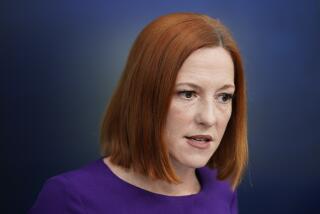HIGHLY RATED : NO PULLBACK IN SIGHT FOR PBS’ ‘FRONTLINE’
- Share via
NEW YORK — At a time when the Public Broadcasting Service is coming under fire for what some conservatives believe to be its political bias, its weekly documentary series “Frontline” is preparing to enter a fifth season with a series of reports that promise to provoke as well as to inform.
“ ‘Frontline’ has found its strength and its heart, and now we must take a giant step forward and find new ways to make documentaries, and to make them more popular,” executive producer David Fanning said here on a recent visit from Boston, where the $7-million series is produced at WGBH-TV.
The weekly series is scheduled to premiere on KCET Channel 28 and other public television stations Jan. 27, with “The Real Stuff,” a look at NASA’s space shuttle program through the eyes of some of its astronauts.
Scheduled for the second show, Feb. 3, is “The Earthquake Is Coming,” a look at what may happen to California and the rest of the country if the major earthquake that has long been predicted finally occurs.
Among the subjects that will be tackled in following weeks, Fanning said, are Nicaragua, Israel, Nazi scientists in the U.S. space program, a “hard look at the Reagan Administration’s war on drugs,” adoption in America and last year’s “MOVE” incident in Philadelphia.
Fanning said that “Frontline” has been insulated from recent questions about the ideological balance of PBS’ programming. The non-commercial network recently announced that it would be conducting an internal review of its program policies and practices.
“PBS has placed its trust in ‘Frontline’ to make its own decisions, and we are going to continue to stand by our own sense of journalism and standards,” he said.
The series proved popular both within the industry and with critics last season, winning four Emmys for documentaries as diverse as “Retreat From Beirut” and “Men Who Molest” and boosting its audience by 15%, according to a WGBH survey.
More significantly, perhaps, the same demographic study showed that half of the show’s regular audience consisted of people whose annual income was under $20,000.
For Fanning, such statistics mean that “Frontline,” which is funded entirely by the Corporation for Public Broadcasting and public television stations, has established roots that extend beyond public television’s traditionally upscale, intellectual audience. And he would like to keep it that way.
“I’d like to prove to people that the documentary is a muscular form--as tart as the best fiction writing, as gritty as the nightly news, as thoughtful or more so than the Sunday morning public-affairs programs,” the British-born Fanning said.
“We plan to continue to do serious, investigative and analytical documentaries on current events, but we also want to touch on more human, real-life stories,” Fanning said.
Emphasizing his commitment to “the rigors of journalism,” Fanning said he hoped to bring together more print journalists, independent film makers and public-television station producers, and to undertake more original research and reporting, all in the pursuit of “less traditional” documentaries.
He said he also would seek more individual voices and opinions for future “Frontlines.” For example, he said that he has offered Bill Moyers, who is returning to PBS from CBS, space on the series for documentaries or special reports of his choosing.
“We are at a time in history when we need help grappling with the philosophical and moral dilemmas we face as we reach the end of the 20th Century,” Fanning said.
More to Read
The complete guide to home viewing
Get Screen Gab for everything about the TV shows and streaming movies everyone’s talking about.
You may occasionally receive promotional content from the Los Angeles Times.






